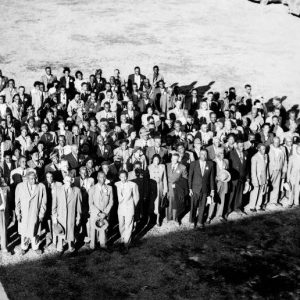calsfoundation@cals.org
Arkansas Farm Bureau Federation
The Arkansas Farm Bureau Federation (AFB) is a private agricultural advocacy group composed of more than 230,000 families working to improve farm and rural life throughout the state. Arkansas was the thirty-ninth state to join the American Farm Bureau. Each county has its own chapter that operates autonomously from the state organization.
The AFB was incorporated on April 28, 1931, with James Feagin Tompkins as the first president. In 1935, the organization began with sixty-five members from Mississippi County, and by the end of 1936, the group boasted 8,657 members across the state. Early leaders of the Arkansas movement cited several reasons why the state needed a strong federation of farmers, such as fighting for farmers’ rights on the state and national level and opposing legislation not in farmers’ interests.
At the first state convention held in Little Rock (Pulaski County) in November 1936, the alliance focused its efforts in supporting measures to reduce freight rates and acquire rural electrification programs through the Rural Electrification Administration (REA). The AFB also promoted programs that encouraged a voice in national politics, parity pricing, breaking monopolies that controlled production and pricing of farm products, increased outlets for farm products, reasonably priced rural health care, strengthened rural schools, fairer tax laws for farmers, and “a fair share of the national income.” During the ensuing decades, Farm Bureau membership grew exponentially.
Women and minorities such as African Americans were represented separately within the organization. Associated Women of the Arkansas County Farm Bureau and the Negro Division of the Arkansas Farm Bureau developed in the 1940s. The Negro Division’s platform was the same as that of its white counterpart, while the women were interested in the improvement of rural libraries, churches, and school lunch programs; increased pay for teachers; and prepaid medical insurance. John Gammon Jr. of Marion (Crittenden County) organized the Negro Division in 1948 and served as its president until 1965. The Negro Division dissolved in 1966 and merged with the parent organization.
The AFB develops policy positions determined through a grassroots process. County organizations present specific objectives at the state conventions that concern farmers in their areas. The issues cover a wide spectrum of propositions that are important to all Arkansans including, but not limited to, agriculture, education, taxes, energy, and roads. Agriculture is Arkansas’s largest industry, and the goal of the agency is to improve the quality of life for rural Arkansans and keep agriculture growing and profitable.
The AFB is an influential element in the lives of all Arkansas farmers. For example, the AFB handles the administrative function for each of the state check-off boards, which are designed to expand the markets for various commodities. The bureau provides daily market updates for farmers and ranchers as well as agricultural education programs, scholarships, and promotional programs. One of the largest services provided by the group is access to a variety of insurance plans. The mission statement of the organization is simple and straightforward: to “advocate the interests of agriculture in the public arena; disseminate information concerning the value and importance of agriculture; and provide products and services which improve the quality of life for our members.”
The AFB has also taken an active role in state politics. For instance, the bureau lobbied against making a first offense of animal abuse a felony in favor of making it a Class A misdemeanor with the enforcement of a felony provision on the second incident of abuse. Likewise, the AFB, since 1957, regularly opposed the establishment of a state department of agriculture on the principle that adding another layer of regulation would prove redundant. But when the majority of the Eighty-fifth Arkansas General Assembly in 2005 supported the creation of such a department, the AFB dropped its opposition and called for both sides to join together in support of the department.
For additional information:
Arkansas Farm Bureau. http://www.arfb.com/ (accessed November 12, 2025).
Eden, Randall. Growing Arkansas: Farm Bureau Role in Arkansas History. Little Rock: Publishing Concepts, Inc., 2003.
“…To Make the Farm Bureau Stronger and Better for All the People.” Central Arkansas Library System YouTube channel, February 1, 2021. Available here (accessed December 4, 2025). [see Related Web Video in sidebar]
Donna Brewer Jackson
Manila, Arkansas





Comments
No comments on this entry yet.